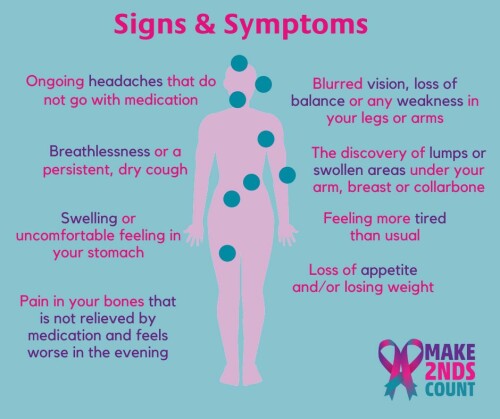Secondary (metastatic) breast cancer can affect multiple areas of the body. Because of this, there are a range of signs and symptoms to look out for.
 Symptoms will also vary from person to person, so it is important that you listen to your body and notice anything new.
Symptoms will also vary from person to person, so it is important that you listen to your body and notice anything new.
Talk to your GP or clinical team as soon as possible if you develop any symptoms that are new, unexplained and persistent.
Common signs and symptoms:
-
Pain in your bones that is not relieved by pain medication, and may worsen in the evening. Different bones can be affected - hear from Community Ambassadors, Anne and Rachel, about their Back Pain and Rib Pain symptoms respectively in these short videos.
-
Breathlessness
-
A persistent dry cough
-
Nausea
-
Feeling more tired than usual - hear from our trustee Lesley and her experience of fatigue as an early symptom in this video.
-
Ongoing headaches that are not relieved by pain medication
-
Unexplained weight loss and/or loss of appetite - listen to our Community Ambassador Tansy’s experience with secondary breast cancer.
-
Depression
-
Swelling and an uncomfortable feeling in your stomach area
-
Blurred vision, loss of balance or any feeling of weakness and numbness in your arms and legs
-
The discovery of lumps or swollen areas under your arm, in your breast and/or your collarbone area. Community Ambassador Mandy highlights the importance of speaking to your GP on the discovery of symptoms.
“I knew this was unusual for me so I booked an appointment with my GP.” - Mandy
If you are experiencing any of the above symptoms, please ensure that you contact your doctor or local breast cancer unit to discuss further.
Owise make an app where you can track more than thirty side effects and symptoms. This will enable you to monitor any changes and share these with your care teams and loved ones. Better communication with your care team can ensure you receive the best care possible.
